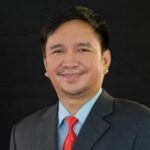Volume 37 Number 3 | June 2023
Charlie P. Cruz, PhD, MLS(ASCPi)CM, RMT, ASCLS-Wyoming Member

This guiding principle aligns with the National Accrediting Agency for Clinical Laboratory Science (NAACLS) standards. I adhere to the stringent delivery of asynchronous and hybrid distance education and advocate proper assessment coupled with cognitive, psychomotor, and affective objectives.
I am keen on selecting the most appropriate teaching strategies, content, and assessment tools. As such, I am inclined to achieve such instructional standards by espousing collaboration, creativity (innovation), critical thinking, and communication—the four Cs of education. The learning management system has been of full utility to me as I exploit the use of voice-over PowerPoint presentations, Zoom recorded lectures, video demonstrations, and other related educational resources in preparing my course content. I harness the learner’s potential for collaboration, creativity, and communication through project-based learning for each course. Project-based learning promotes knowledge and warrants a high level of comprehension, problem-solving skills, inquisitiveness, commitment, decision-making, and community involvement.
Central to medical laboratory science is the in-campus laboratory sessions designed to stimulate scientific skills and attitudes. In these core competencies, I inculcate the value of collaboration by allowing the learners to foster teamwork through group work and the performance of laboratory tests with peer evaluation.
“I make it a point that I will harness the learner’s potential for collaboration, creativity, and communication through project-based learning for each course.”
At the end of all the assigned tasks, I employ several techniques to assess the quality and accuracy of the learner’s work. For example, I implement case studies and assessments of journal articles when I deem critical thinking skills are required for a given set of tasks. On the other hand, to realize the cognitive objectives, I engage the learners in BOC-simulated multiple-choice tests, case study reports, and problem-based learning. My way of measuring the psychomotor competence of the learner is based highly on their performances on return demonstrations, role-playing, and rubricbased laboratory performance.
The Advanced Clinical Practicum: Microbiology Course is offered in a hybrid modality and requires an intensive, three-day, on-campus laboratory session. The Canvas-based learning materials and resources are made entirely accessible to students on the first day of the semester. Students take a pre-test and a comprehensive examination to determine their strengths and weaknesses, which, in turn, form the basis for designing targeted learning experiences in the student laboratory.
In this clinical practicum course, students will experience the complete workflow of activities in the actual clinical laboratory setting using the laboratory information system (LIS) during their three-day laboratory immersion. The simulation begins with a physician’s request and culminates with a laboratory test report. For this experience, actual patient specimens are utilized to challenge the students’ sample processing skills. Group work is encouraged in the performance of the tests and procedures, underscoring the importance of mentorship. I employ return demonstrations, peer evaluation, and rubric-based laboratory performance evaluation to assess the student’s performance. Based on the observations of NAACLS, our clinical practicum experiences are comparable to and even more enriching than what the students would learn in an external clinical affiliate setting, as we can direct all learning experiences.
My role as an educator in fostering fairness and respect for the learner’s intent to gain knowledge and skills is exemplified by providing them with relevant and on-time grading and feedback mechanisms. In my experience, learners can better understand their strengths and weaknesses when feedback about their performance is communicated.
My mission to create a realm of lifetime learners in the medical laboratory science is best fulfilled when I uphold effective pedagogies. My ways of nurturing these digitally connected minds are coupled with expansive use of modern technology and up-to-date teaching materials in the form of modules or laboratory manuals.
For some, the catchword “lifetime learning” might be a cliché. But it is a shibboleth that will never be outmoded. Its relevance will continue as long as the world continues to generate thinkers and aspirants who believe in sustaining the future.
Charlie P. Cruz is Associate Lecturer in Medical Laboratory Sciences in the College of Health Sciences, School of Pharmacy, at the University of Wyoming in Casper, Wyoming.